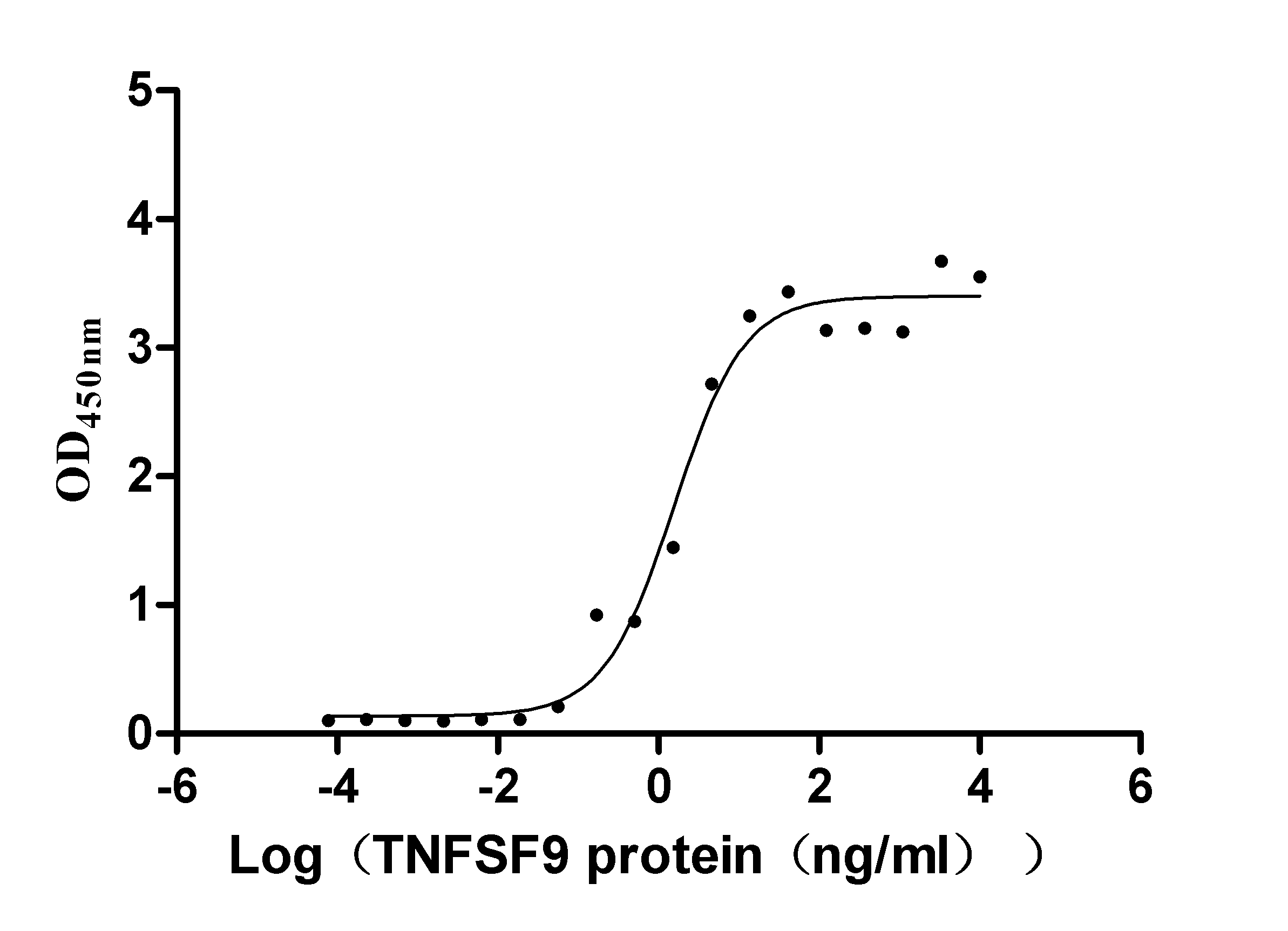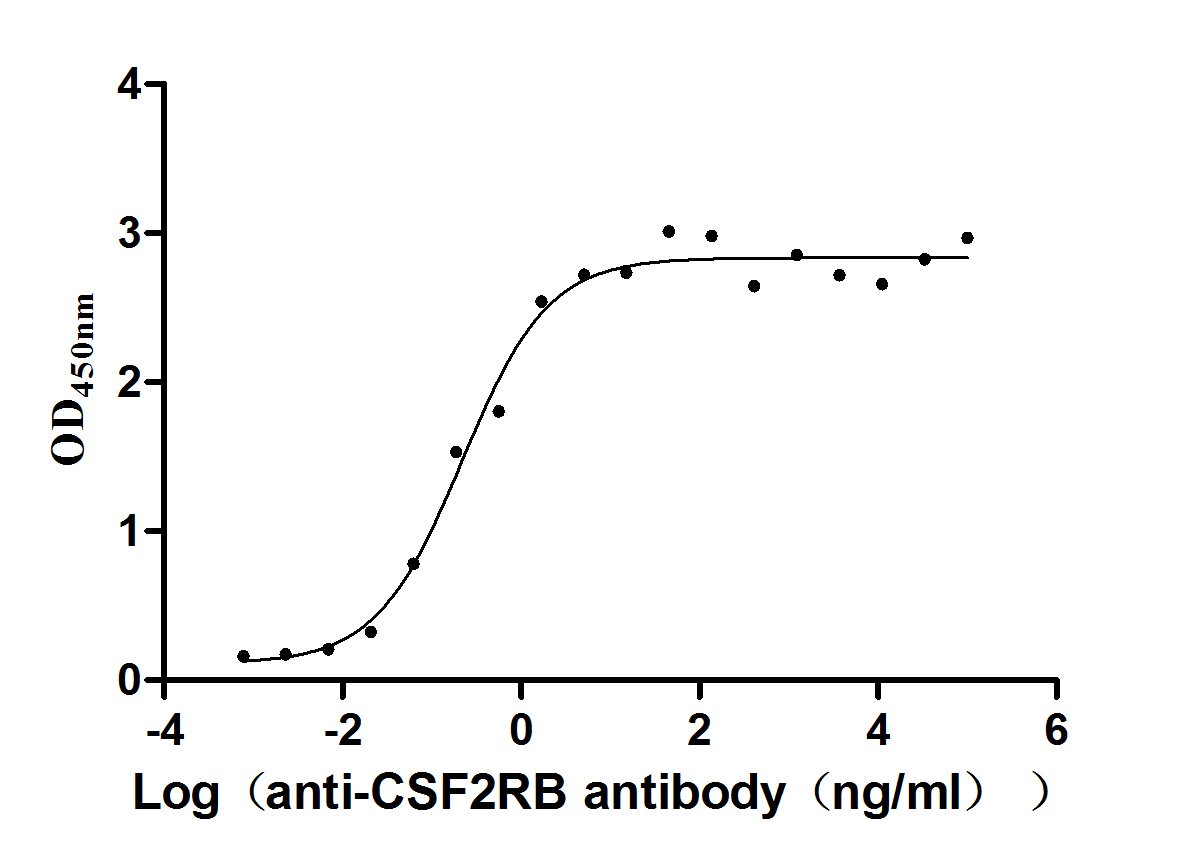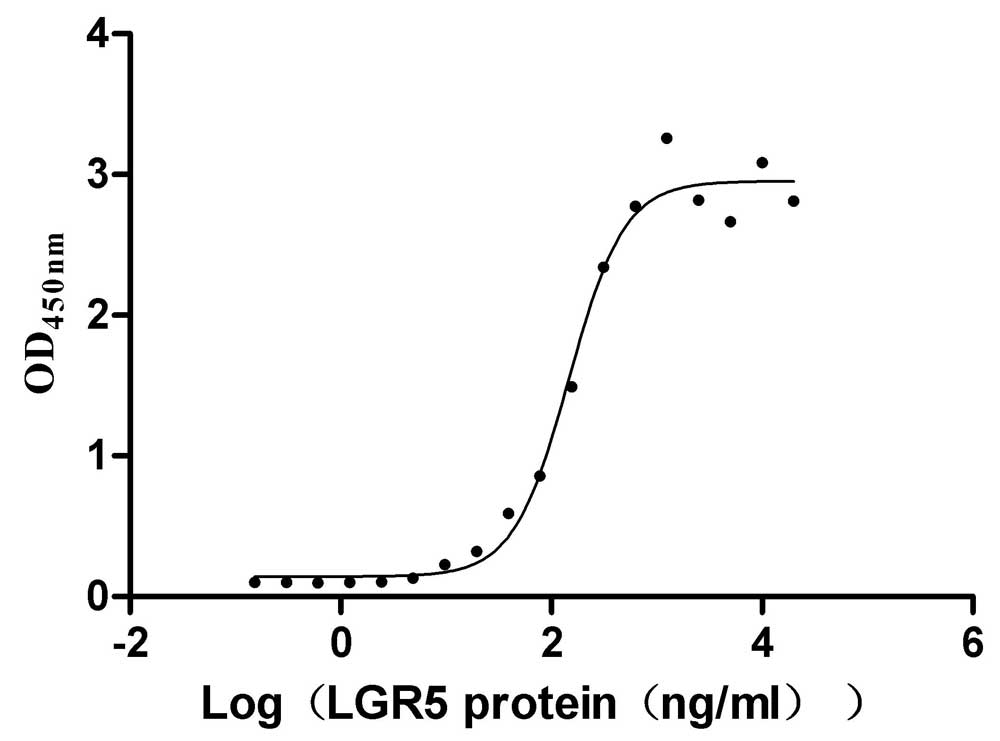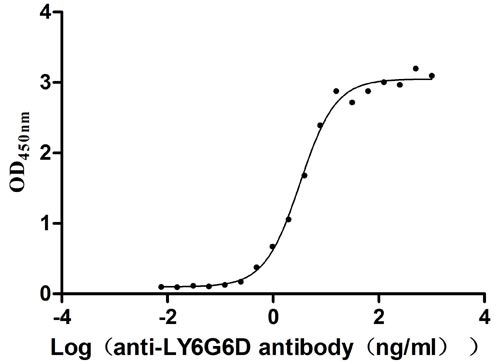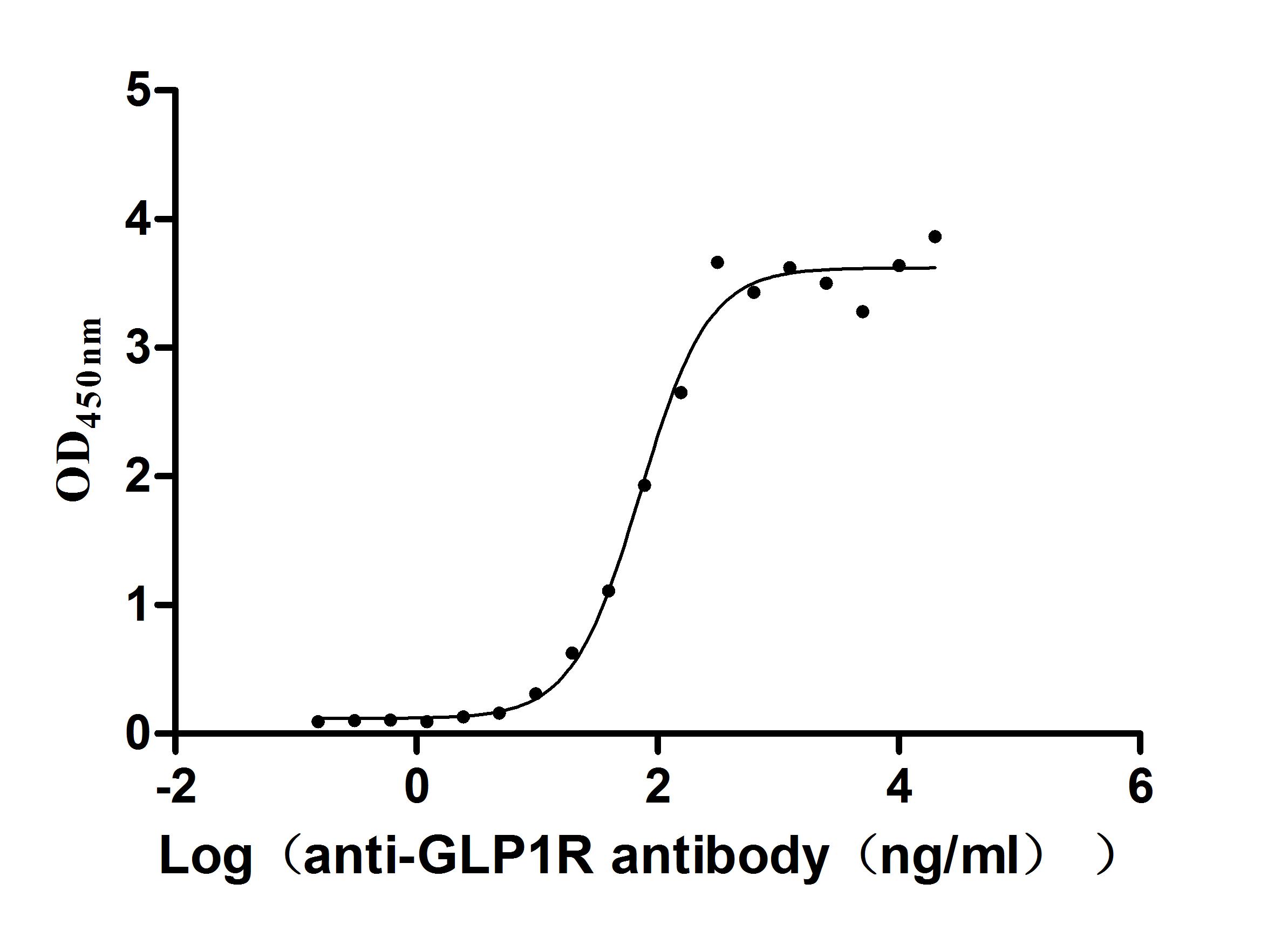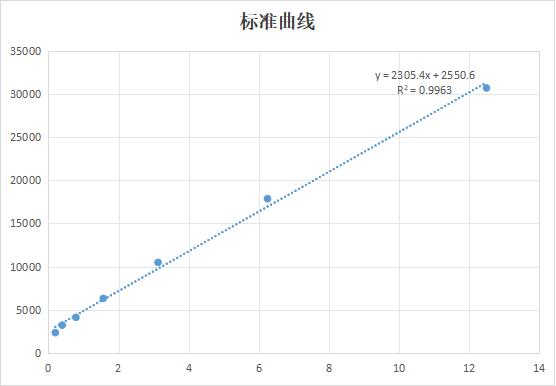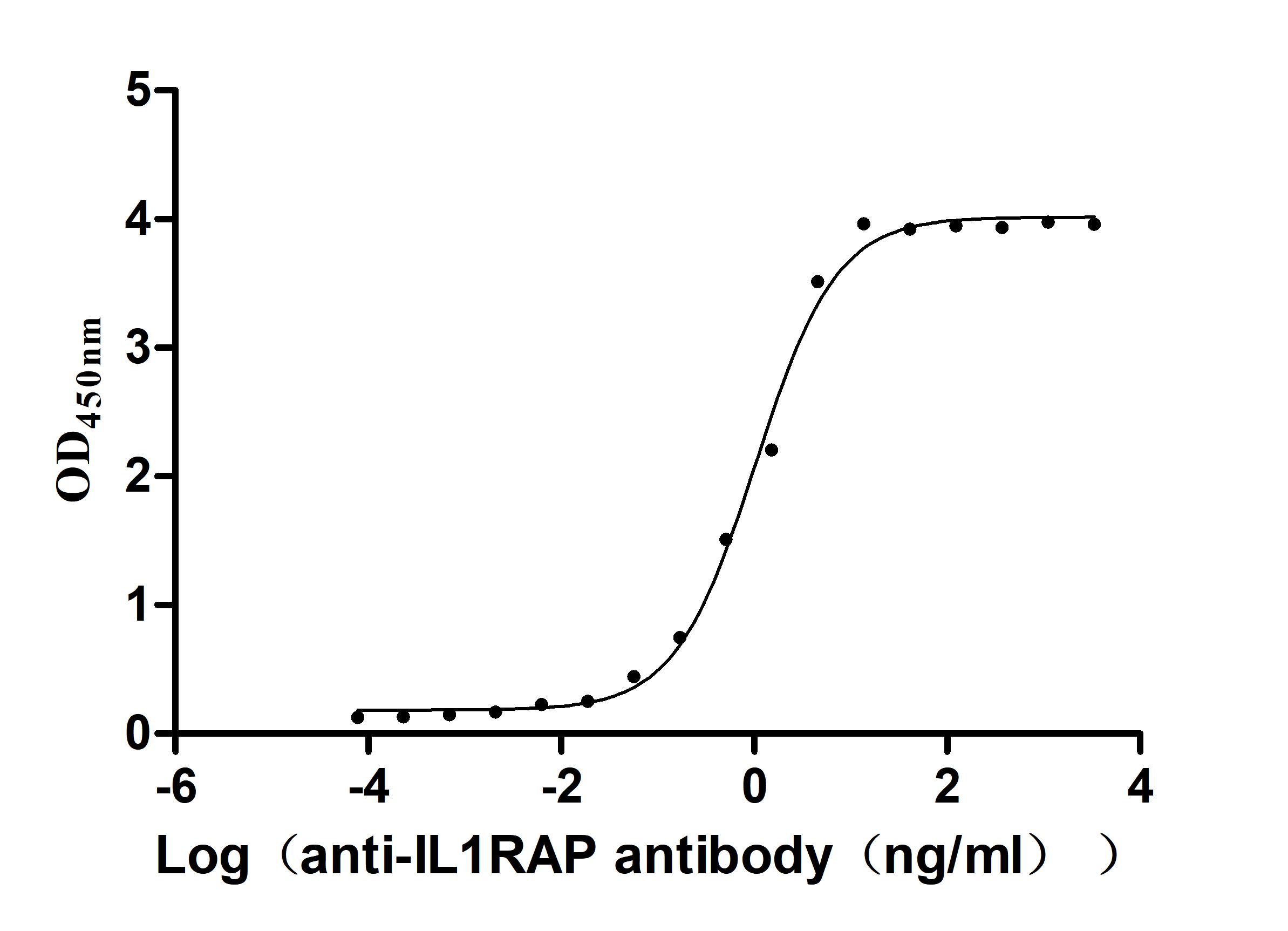Recombinant Human Receptor-type tyrosine-protein phosphatase kappa (PTPRK), partial
-
货号:CSB-YP613588HU
-
规格:
-
来源:Yeast
-
其他:
-
货号:CSB-EP613588HU
-
规格:
-
来源:E.coli
-
其他:
-
货号:CSB-EP613588HU-B
-
规格:
-
来源:E.coli
-
共轭:Avi-tag Biotinylated
E. coli biotin ligase (BirA) is highly specific in covalently attaching biotin to the 15 amino acid AviTag peptide. This recombinant protein was biotinylated in vivo by AviTag-BirA technology, which method is BriA catalyzes amide linkage between the biotin and the specific lysine of the AviTag.
-
其他:
-
货号:CSB-BP613588HU
-
规格:
-
来源:Baculovirus
-
其他:
-
货号:CSB-MP613588HU
-
规格:
-
来源:Mammalian cell
-
其他:
产品详情
-
纯度:>85% (SDS-PAGE)
-
基因名:PTPRK
-
Uniprot No.:
-
别名:dJ480J14.2.1; DKFZp686C2268; DKFZp779N1045; OTTHUMP00000017180; OTTHUMP00000017181; OTTHUMP00000017182; OTTHUMP00000017187; OTTHUMP00000040306; Protein tyrosine phosphatase kappa; Protein tyrosine phosphatase kappa precursor; Protein tyrosine phosphatase receptor type K; Protein tyrosine phosphatase receptor type kappa; Protein-tyrosine phosphatase kappa; PTPK; PTPkappa; Ptprk; PTPRK_HUMAN; R PTP kappa; R-PTP-kappa; Receptor type tyrosine protein phosphatase kappa; Receptor-type tyrosine-protein phosphatase kappa
-
种属:Homo sapiens (Human)
-
蛋白长度:Partial
-
蛋白标签:Tag type will be determined during the manufacturing process.
The tag type will be determined during production process. If you have specified tag type, please tell us and we will develop the specified tag preferentially. -
产品提供形式:Lyophilized powder
Note: We will preferentially ship the format that we have in stock, however, if you have any special requirement for the format, please remark your requirement when placing the order, we will prepare according to your demand. -
复溶:We recommend that this vial be briefly centrifuged prior to opening to bring the contents to the bottom. Please reconstitute protein in deionized sterile water to a concentration of 0.1-1.0 mg/mL.We recommend to add 5-50% of glycerol (final concentration) and aliquot for long-term storage at -20℃/-80℃. Our default final concentration of glycerol is 50%. Customers could use it as reference.
-
储存条件:Store at -20°C/-80°C upon receipt, aliquoting is necessary for mutiple use. Avoid repeated freeze-thaw cycles.
-
保质期:The shelf life is related to many factors, storage state, buffer ingredients, storage temperature and the stability of the protein itself.
Generally, the shelf life of liquid form is 6 months at -20°C/-80°C. The shelf life of lyophilized form is 12 months at -20°C/-80°C. -
货期:Delivery time may differ from different purchasing way or location, please kindly consult your local distributors for specific delivery time.Note: All of our proteins are default shipped with normal blue ice packs, if you request to ship with dry ice, please communicate with us in advance and extra fees will be charged.
-
注意事项:Repeated freezing and thawing is not recommended. Store working aliquots at 4°C for up to one week.
-
Datasheet :Please contact us to get it.
相关产品
靶点详情
-
功能:Regulation of processes involving cell contact and adhesion such as growth control, tumor invasion, and metastasis. Negative regulator of EGFR signaling pathway. Forms complexes with beta-catenin and gamma-catenin/plakoglobin. Beta-catenin may be a substrate for the catalytic activity of PTPRK/PTP-kappa.
-
基因功能参考文献:
- PTPRK was identified as a direct target of miR-1260b, and PTPRK expression was inversely correlated with miR-1260b in non-small cell lung cancer cell lines and clinical tissues PMID: 29628123
- Study found a significant association between PTPRK genetic variants and the risk and age at onset of Alzheimer's disease in two independent samples, and provided initial evidence of several genetic variants in PTPRK influencing the risk of cancer and cholesterol levels. PMID: 28987514
- The present study identified RSPO fusion transcripts, including three novel transcripts, in one-third of colorectal Traditional serrated adenoma (TSA) and showed that PTPRK-RSPO3 fusions were the predominant cause of RSPO overexpression in colorectal TSA. PMID: 28543708
- PTPRK plays dual roles in coordinating angiogenesis. It plays a positive role in cell proliferation, adhesion and tubule formation, but suppresses cell migration, in particular, the FGF-promoted migration. PMID: 28259897
- PTPRK-RSPO3 fusions and RNF43 mutations were found to be characteristic genetic features of traditional serrated adenomas (TSAs). PMID: 26924569
- By regulating phosphorylation of SRC, RPTPkappa promotes the pathogenic action of rheumatoid arthritis fibroblast-like synoviocytes, mediating cross-activation of growth factor and inflammatory cytokine signalling by TGFbeta in RA FLS. PMID: 25378349
- Notch and TGF-beta act in concert to stimulate induction of PTPRK, which suppresses EGFR activation in human keratinocytes. PMID: 25609089
- Findings strongly indicate that the tyrosine phosphorylation of CD133, which is dephosphorylated by PTPRK, regulates AKT signaling and has a critical role in colon cancer progression. PMID: 24882578
- PTPRK underexpression leads to STAT3 activation and contributes to nasal NK/T-cell lymphoma pathogenesis PMID: 25612622
- PTPRK showed lower mRNA expression in duodenal mucose of celiac disease patients. PMID: 23820479
- High expression of PTPRK is associated with prostate cancer. PMID: 24002526
- Tumor derived mutations of protein tyrosine phosphatase receptor type k affect its function and alter sensitivity to chemotherapeutics in glioma. PMID: 23696788
- PTPRK is a negative regulator of adhesion, invasion, migration, and proliferation of breast cancer cells. PMID: 23552869
- PTPkappa was scissored by the processed form of proprotein convertase 5, and galectin-3 binding protein which is over-produced in colon cancer cells and tissues. PMID: 21094132
- These data describe a novel mechanism of cross-talk between EGFR and TGF-beta pathways, in which RPTP-kappa functions to integrate growth-promoting and growth-inhibiting signaling pathways. PMID: 19864455
- Our results suggest that GnT-V could decrease human hepatoma SMMC-7721 cell adhesion and promote cell proliferation partially through RPTPkappa. PMID: 19911372
- RPTP-kappa is a key regulator of EGFR tyrosine phosphorylation and function in human keratinocytes PMID: 16263724
- the crystal structure of catalytically active, monomeric D1 domain of RPTPkappa at 1.9 A. RPTPkappa is monomeric in solution and crystal structure. PMID: 16672235
- EGF receptor is activated in human keratinocytes by oxidative inhibition of receptor-type protein-tyrosine phosphatase kappa by ultraviolet irradiation PMID: 16849327
- EBNA1 apparently disables TGF-beta signaling, which subsequently decreases transcription of the PTPRK tumor suppressor PMID: 17720884
- PTPRK influences transactivating activity of beta-catenin in non-tumoral and neoplastic cells by regulating the balance between signaling and adhesive beta-catenin, thus providing biochemical basis for the hypothesis of PTPRK as a tumor suppressor gene. PMID: 18276111
- overexpression of GnT-V in a hepatoma cell line not only induced the addition of beta1,6 GlcNAc branch to N-glycan of RPTPkappa but also decreased the protein level of RPTPkappa PMID: 19236842
- These data indicate that PPTRK positively regulates ERK1/2 phosphorylation, which impacts CD4(+) T cell development. PMID: 19800317
显示更多
收起更多
-
亚细胞定位:Cell junction, adherens junction. Cell membrane; Single-pass type I membrane protein.
-
蛋白家族:Protein-tyrosine phosphatase family, Receptor class 2B subfamily
-
组织特异性:High levels in lung, brain and colon; less in liver, pancreas, stomach, kidney, placenta and mammary carcinoma.
-
数据库链接:
HGNC: 9674
OMIM: 602545
KEGG: hsa:5796
STRING: 9606.ENSP00000357196
UniGene: Hs.155919
Most popular with customers
-
Recombinant Human Tumor necrosis factor receptor superfamily member 9 (TNFRSF9), partial (Active)
Express system: Mammalian cell
Species: Homo sapiens (Human)
-
Recombinant Human Cytokine receptor common subunit beta (CSF2RB), partial (Active)
Express system: Mammalian cell
Species: Homo sapiens (Human)
-
Recombinant Human R-spondin-1 (RSPO1), partial (Active)
Express system: Mammalian cell
Species: Homo sapiens (Human)
-
Recombinant Human Lymphocyte antigen 6 complex locus protein G6d (LY6G6D) (Active)
Express system: Yeast
Species: Homo sapiens (Human)
-
Recombinant Human Glucagon-like peptide 1 receptor (GLP1R), partial (Active)
Express system: Mammalian cell
Species: Homo sapiens (Human)
-
Recombinant Human Myosin regulatory light chain 12A (MYL12A) (Active)
Express system: E.coli
Species: Homo sapiens (Human)
-
Recombinant Human Urokinase-type plasminogen activator(PLAU) (Active)
Express system: Mammalian cell
Species: Homo sapiens (Human)
-
Recombinant Macaca fascicularis Interleukin 1 receptor accessory protein(IL1RAP), partial (Active)
Express system: Mammalian cell
Species: Macaca fascicularis (Crab-eating macaque) (Cynomolgus monkey)


